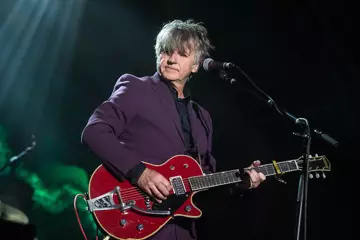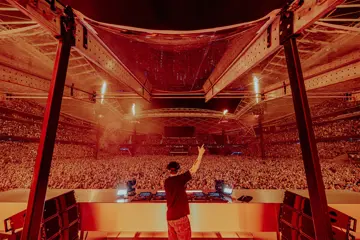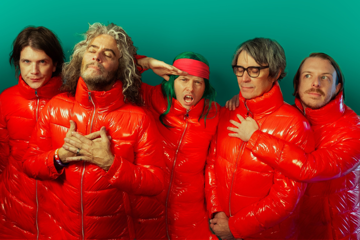Now that Metric's latest Synthetica set has landed, Jimmy Shaw, the band's guitarist (who also plays synth and theremin), acknowledges that regulating the quality of material shared via YouTube and social networking sites is challenging. “People want you to put out music all the time and you have to have something to say on Twitter ten times a day, and photographs on Instagram, and updates on Facebook and, I mean, it's like you have to constantly supply the world with as much information as you can,” he opines. “And sometimes there just isn't that much happening, you know? It's like: there's only so many lobbies of hotels I could photograph without it becoming extremely boring… A lot of the mystery is gone, so the more that you can play little games and create whatever sort of mystery you can, the better.”
Since the album's lead single is called Youth Without Youth, Shaw is asked to reflect on his formative years. The multi-instrumentalist chuckles and then offers, “Put it this way, if you'd seen my report card it would've looked something like this: music 99 and then a series of 51s after that.” We're tipping Physical Education would have been one of the “51s”. “Absolutely! Pool – you know, swimming – was one of the classics and I just refused to do it. I was a really, really skinny little kid and I just didn't wanna get in a bathing suit and get in this gross pool with, you know, 2,000 other kids: it was nasty to me. So I just refused to go in the pool. I didn't swim once the entire time I was in high school and they used to hate me for that. Every single week it's like, 'Up to the principal's office.' I spent a lot of time in the principal's office. But usually the music teacher would come and rescue me and go, 'No, you can't get this kid in trouble, he's the star music student and we need 'im.'”
Shaw started his musical life as a classical trumpet player, attending “a school in Philadelphia called Curtis” and then “The Juilliard Institute in New York... When I was twelve and thirteen, I was playing in a brass quintet and I played at probably about 120 concerts in the two years and I travelled all over North America. I went on a two-week tour of Japan,” he elaborates, as if it's nothing. Shaw then wound up playing in the New York Philharmonic at an age he admits was exceptionally young for such an achievement. “But by the time I was kind of nineteen or twenty, I realised that it was not my calling at all. I didn't wanna be part of that and I found the classical music world very uptight and stuffy, and you just sort of play the same pieces of music over and over and over again for the next fifty years. It just wasn't the life for me. I needed more artistic freedom than that. That's when I started listening to records and I sold a lot of my trumpets when I was at Juilliard and bought an eight-track and a guitar and synthesiser, and started making pop music.”
On how this classical training aided or impeded his transition into rock'n'roll, Shaw reflects, “I've definitely had to unlearn some things in the process, you know, because rock'n'roll isn't about being right; a lot of the time it's actually about being wrong and it working anyway. It's way more about attitude than it is about playing the right note and, as a guitar player especially, I really had to learn that aspect of playing. When we first started touring I was a very safe guitar player and Josh [Winstead, bass] and Joules [Scott-Key, drums/percussion] in the band used to say to me all the time, they're like, 'Dude, you need to unhinge a little bit. Like, go crazy!' And I remember when we were playing shitty little punk bars and whiskey-fuelled, really down and dirty rock'n'roll, man, when I first started playing guitar solos like that, I used to think it was the worst thing, like, 'Jesus, that was absolutely horrible!' And the two of them would always come backstage afterwards and go, 'That was amazing, do that again!' So I definitely had to learn the other aspect of making music with an attitude as opposed to just being correct.”
Don't miss a beat with our FREE daily newsletter
Describing the distinction between listening to recorded material and the live gig experience, Shaw reckons “It's like the difference between reading a screenplay and watching a movie itself... When I go see a concert I wanna see something transpire, you know, I wanna see something happen. I don't wanna just see the person play the record, I wanna see an event… I think it's up to the artist to make sure that the live experience is its own thing completely.”
Metric ensure every performance is unique and gratifying by including “a couple of pieces of music within a live set that [they] would never, ever, ever play the same twice... For years it was the two songs, Dead Disco and Empty – I don't think I've ever played the same guitar solo ever, not even close to the same thing. And sometimes the solo happens in a different place; sometimes it goes on forever, sometimes it doesn't. Back in the earlier days we were definitely really, really into doing that, you know? A couple of years ago I was just sort of browsing through YouTube and I found this version of Dead Disco that we played at the Great American Music Hall in San Francisco – which is the amazing, legendary venue – and this version was twenty-six minutes long. And Emily [Haines, frontvixen] is ranting and flying up and down the stage. I mean, it's not as though we don't do it anymore, you know? But there were a few years there in the middle where we were just totally overindulging in the idea of freeform improvisation within a rock'n'roll show and, in a way, I think it's what we became known for as a live act a little bit, 'You never really know what's gonna happen.'”
Haines has “tamed down a little bit” now, according to Shaw, “because she used to jump off twenty-foot speaker stacks and crowd-surf and she's torn down barricades and done some crazy shit in her time... But all that was in the pursuit of this transcendental experience. And the whole thing just sort of seems unhinged and on the edge of collapse at all times. To us that's very exciting; that's a very integral part of the rock'n'roll experience.”
These moments of visceral connection can certainly be felt from the crowd and it's what makes live music such a rewarding communal experience. “Oh, absolutely, “ Shaw enthuses. “It's really only those concerts where every single person in the room – the four members in the band and every single audience member – are truly connected that it really spirals up and transcends. If the audience is not really there then the band's not really gonna be there either. I mean, it's a conversation between the stage and the audience every single night, and it's when that conversation is fluid and you're communicating with each other that it really has the ability to just blow everyone's minds, us included.”















